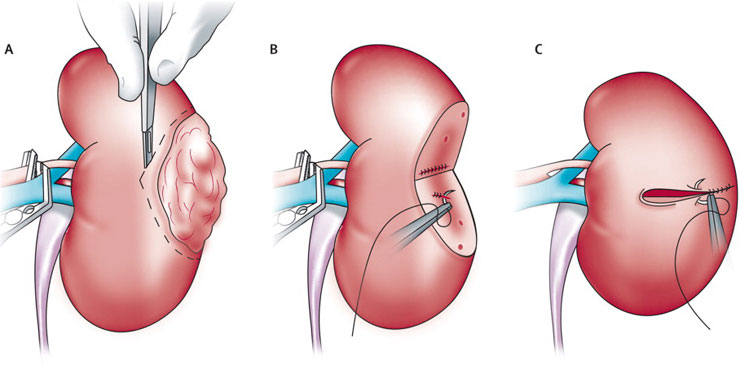

Partial Nephrectomy (PN), also known as nephron-sparing surgery, is a surgical procedure where only the diseased or damaged part of the kidney is removed, preserving the healthy, functioning portion. This procedure is commonly used to treat small kidney tumors, localized renal masses, or benign growths while maintaining maximum kidney function.
Indications for Partial Nephrectomy
- Small Kidney Tumors: Typically tumors ≤ 4 cm (T1a stage) but can be considered for tumors up to 7 cm.
- Localized Renal Cell Carcinoma (RCC): Early-stage kidney cancer confined to one portion of the kidney.
- Benign Renal Masses: Such as angiomyolipomas or oncocytomas.
- Bilateral Tumors or Solitary Kidney: To preserve kidney function when both kidneys are affected or in cases where the patient has only one functional kidney.
- Hereditary Conditions: Such as Von Hippel-Lindau syndrome, which increases the risk of multiple kidney tumors.
How is Partial Nephrectomy Performed?
- Preoperative Evaluation: Imaging studies (CT, MRI, or ultrasound) to assess tumor size and location.
- Anesthesia: Performed under general anesthesia.
- Tumor Resection and Closure: The diseased portion of the kidney is carefully removed.
Benefits of Partial Nephrectomy
- Preserves Kidney Function: Minimizes loss of healthy renal tissue.
- Effective Tumor Removal: Removes cancerous or abnormal tissue while retaining healthy kidney tissue.
- Lower Risk of Chronic Kidney Disease (CKD): Compared to total nephrectomy.
- Minimally Invasive Options Available: Faster recovery with laparoscopic or robotic approaches.
Partial Nephrectomy is a highly effective, kidney-preserving surgical procedure for managing localized kidney tumors or masses. It maintains optimal kidney function while providing excellent oncological outcomes, making it the preferred choice for suitable patients with early-stage kidney cancer or benign renal growths.